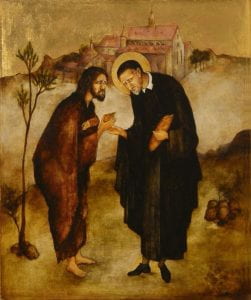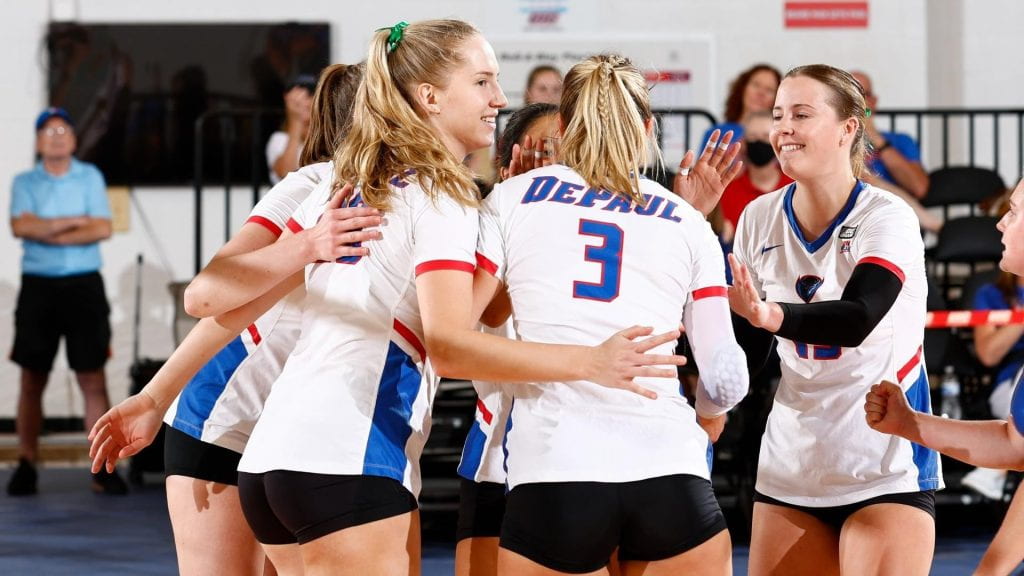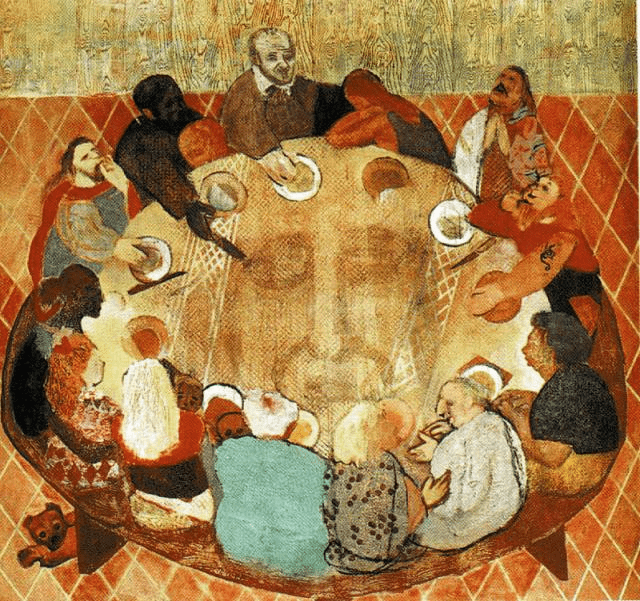Happy St. Vincent de Paul Heritage Week!
Each year on September 27th, the Vincentian Family and the Catholic Church worldwide celebrate the Feast Day of St. Vincent de Paul. Here at DePaul University, the Division of Mission and Ministry (DMM) typically builds a week of events connected to the Feast Day. This year, these include a Loop Campus Luncheon on Wednesday, a Friday Prayer Breakfast, Feast Day Masses at each campus with lunch included, and the always popular Vinny Fest! This year we have added an interfaith dialogue-oriented event falling on Monday, September 23rd, entitled “In To Light” and a Sustainability Network Weaving event on Wednesday. We hope you will RSVP and join us for one or more of these events during this week!

This year, during St. Vincent de Paul Heritage Week, I’d like to invite the university community to reflect on the question, “What is the Vincentian way?” In other words, what does the adjective “Vincentian” mean for the way you go about your life and work specifically at DePaul (rather than how you might at another higher ed institution, for example)? What do you do differently because you are at DePaul, where we seek to put our Vincentian mission into practice?
One important question in this conversation is whether and how any understanding of the adjective “Vincentian” connects back authentically and substantively to our founder and the larger Vincentian family, which grew from his life example and work. Here are a few ideas offered to initiate a conversation about what defines a Vincentian way:
- Reflection on experience: Since 2002, the Division of Mission and Ministry’s (DMM) Vincentian Community Service and Formation Office (VSFO) team has practiced a model of service, reflection, and community engagement with students. The model they use is called “VIA,” an acronym for “Vincentians in Action.” You may recognize that the word “VIA” can be translated as “the way,” and it is derived from the work of Theodore Weisner, C.M. Weisner writes from a historical and theological perspective as a Christian, Catholic, Vincentian priest, and also the perspective of Vincent de Paul, yet the insights he offers have found resonance with students from many diverse religious and secular worldviews for the past two decades.
Weisner suggests three important dimensions of a process of transformation (or conversion) rooted in attending carefully to reality and reflecting on our experiences and encounters in the context of service:
- the way of awareness and appreciation
- the way of dialogue
- the way of solidarity
This approach offers a valuable contribution to what might be considered a Vincentian way. Begin with awareness and appreciation. Enter more deeply into relationship through dialogue. Recognize our fundamental interdependence and stand and walk together with others in solidarity.
2. Openness to “encountering God” through our relationships: Inherent in Weisner’s work is a focus on “encountering God” in our relationships. This focus needs to be further unpacked to understand how it is a core part of a Vincentian way. Ultimately, it is about recognizing that there is much more going on in our experiences and relationships than a transactional or superficial exchange. Those who are not theists might participate in this encounter through honoring the deep meaning and wisdom revealed through relationships and life experience.
-
- First, Vincent de Paul clearly understood God’s “Providence” to be present concretely in the lived experiences of our lives. Therefore, making intentional space to reflect together, or to “look again” at how God, or a deeper meaning, might be present in those experiences is an important part of a Vincentian way of proceeding. Vincent was careful to emphasize to his followers that they focus not on what they were doing for themselves, so much as on what God was doing in and through their experiences and encounters. He suggested that “wisdom consists in following Providence step by step” and “the things of God come about by themselves,” not (only) through human effort. [1] Careful attention to the presence and movement of Providence, or the deeper meaning inherent in the events and relationships in our lives, is another important dimension of any approach we might deem to be the Vincentian way.
- Second, another aspect of a Vincentian way that emerges from Weisner’s work is a strong emphasis on relationships, or a relational approach to transformation. While we often emphasize Vincent’s pragmatism or what we interpret through our more contemporary language to be a commitment to social justice, it is Vincent’s relational approach to working for social or systemic change that I would suggest is distinctly characteristic of a Vincentian way. A strong case can be made that Vincent experienced transformation primarily through relationships with a broad range of people at all levels of society.
- A third point of emphasis that follows from Weisner’s work is that Vincent clearly understood encounters or relationships with those most abandoned in society as central to his mission. It was in these relationships, he believed, that God would be encountered, and transformation would happen. He understood that recognizing and responding with compassion to the spiritual and physical needs of the impoverished was at the very heart of what he was called to address.
3. Simplicity: To further deepen the emphasis on Vincent’s relational approach, we have come to understand figuratively that he “always wore the same cloak,” regardless of who he was with, whether someone begging in the streets or the most powerful people in the country. To me, this means he valued simplicity and transparency, that is, remaining focused on what was most important and being direct and straightforward, rather than overly complicated or pretentious. It meant not putting on airs with the well-to-do, pretending to be who he was not, or treating them any differently than he did the poorest of the poor, always emphasizing the sacred dignity of the other. Vincent was known to have said that “simplicity is the virtue I love the most and to which, I think, I pay the most attention in my actions.” [2] How often do we get bogged down on the complexity of things and lose touch with the simple essence of who we are called to be, or the most straightforward solution to an issue? This call to simplicity—to be honest, direct, humble, straightforward—is, I believe, a key element of a Vincentian way.
4. An Asset-Based Approach: DePaul’s Steans Center for Community-Based Service Learning, in partnership with the Asset-Based Community Development Institute (ABCDI) housed there, emphasizes and practices another characteristic dimension of a Vincentian way, flowing naturally from the previous emphases above: an asset-based approach. If we recognize, as Vincent did, the presence of Providence in our life events and relationships, then we have our eyes open for what is already present. We trust in what has already been given or is yet unrecognized more than focusing our energies on what is lacking, which is a deficit-minded approach. Vincent de Paul was a master at recognizing and developing the talent and potential in others while encouraging and empowering them to orient it for good. This is evident in his recognition of the untapped potential of the rural poor, such as the classic example of Marguerite Naseau. The Steans Center, ABCDI, and DePaul’s Council on Community Engagement use an asset-based approach to center the strengths and leadership of those in the communities with whom they engage, thus counteracting a deficit-based approach that tends to be imperious rather than empowering.
5. Motivated by Love: One final characteristic that is integral to a Vincentian way is that of charity (caritas, love). Because Vincent de Paul was known as the “apostle of charity,” I use this word, even though it is often mischaracterized today, particularly as a contrast to social justice. Rather, I believe, charity is an affective and relational dimension essential to social justice, particularly when we speak of addressing the needs of society’s most abandoned and forgotten. Love is also important in the field of education, often reflected in one’s investment in a subject of learning, as well as in our motivations for teaching and educating. Furthermore, learning to see the other through a “charitable” or appreciative lens is essential to the bridge-building needed in communities harmed by antagonistic conflict.
I hope these five ideas can get the conversation started. Please share your thoughts on these questions by adding a comment below or sharing with others this week when you attend Heritage Week events!
Reflection/Discussion Questions:
- How would you describe a Vincentian way of engaging in service, in your work, or in your life and relationships?
- How might you more intentionally integrate a Vincentian way into your approach to your work and life at DePaul?
Reflection by: Mark Laboe, Interim VP for Mission and Ministry
[1] Letter 720, “To Bernard Codoing, Superior, in Rome,” August 6, 1644, CCD, 2:521.
[2] Letter 188, “To François du Coudray, in Rome,” n.d., CCD, 1:265.




